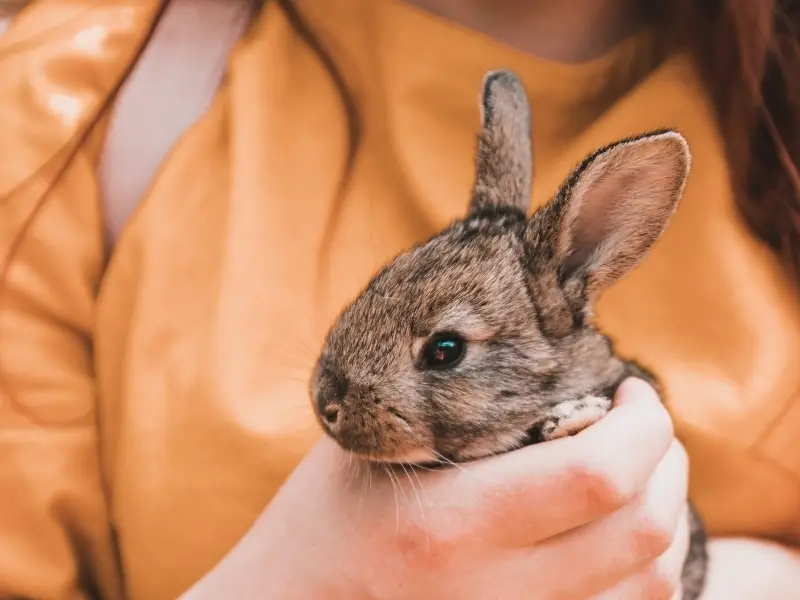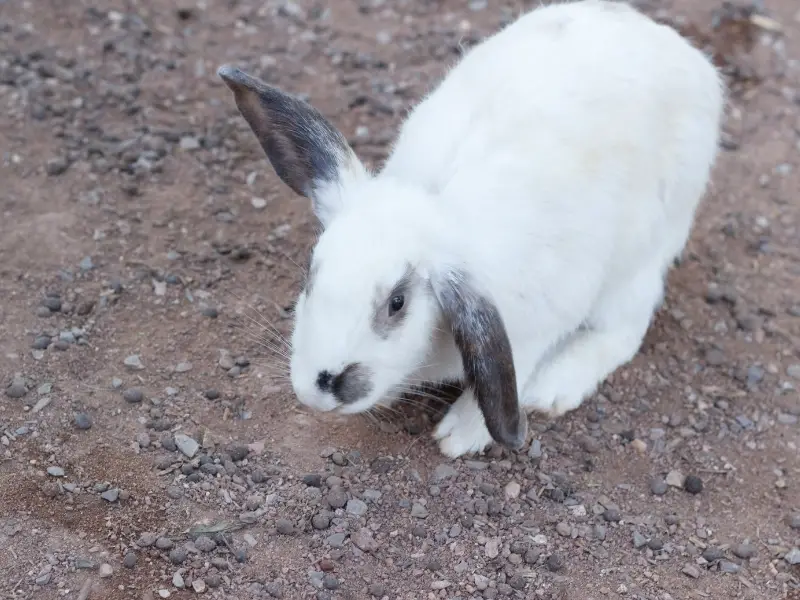Compared to cats and dogs, rabbits are rather quiet pets that aren’t known for making loud noises or disturbing neighbors. While they are for the most part noiseless, rabbits can make a wide variety of sounds, some of which may surprise you.
So, what does a rabbit in distress sound like? Rabbits produce distressed sounds when they are scared, injured, in danger, or in severe pain. In these cases, a rabbit will produce sounds such as hissing, growling, teeth grinding, or even screaming. If your pet rabbit produces any of these sounds it might be in severe pain, so call your vet.
In this article, we’ll tell you how to know if your rabbit is in pain and what are the signs of a rabbit in distress. Continue reading, to find out!
What Does a Rabbit in Pain Sound Like?
Like all other animals, rabbits have a way of telling us how they are feeling, whether they are happy or in pain. Being a prey animal, rabbits learn from a young age to hide weakness or illness, otherwise, they will become someone’s next meal.
With pet rabbits, this protective instinct may backfire because you won’t always recognize that your bunny is sick or in pain. So, once your rabbit does show signs of pain, know that the situation is dire.
Teeth grinding is one of the sounds your rabbit can make while in pain. The sound of a rabbit’s teeth grinding is hard to miss, and can’t be mistaken for anything else.
Although rabbits produce the purring sound the same way, you’ll hardly mistake teeth grinding as purring. If your bunny is grinding its teeth, it is in a lot of pain and needs immediate veterinary assistance.
If your rabbit starts crying without an apparent reason, there is a big chance that they are in pain. Often, the crying noises will come out sounding like whimpers and grunts.
Many different illnesses can cause your bunny to cry and whimper in pain, but the most common are urinary tract disorders, GI stasis, infections, and arthritis (source).
If you hear any of these sounds, know that your rabbit has been hiding the pain for a while now. So as soon as you hear teeth grinding, whimpering, or crying take your furry pet to a vet for a full checkup.
How Do I Know If My Rabbit Is in Pain?
Besides making strange sounds, rabbits have other ways of showing you that they are in pain. But because your furry companion can’t tell you exactly where it hurts and how much, you’ll have to rely on observing and interpreting your pet’s behavior.
If your pet bunny is ill and in pain, you may notice some of the following symptoms:
- Grinding teeth
- Huddled or hunched appearance
- Rapid and shallow breathing
- Reluctance to move
- Disheveled appearance
- Lethargy
- Increased thirst and urination
- Pulling hair
- Taking longer to eat
When in pain some rabbits will appear to breathe from their stomachs instead of their chests. Other rabbits may press their abdomens to the ground or extend their necks.
Without medical attention and proper treatment, your bunny will slowly stop eating and defecating, its body will shut down, and eventually, your rabbit will die (source).
To prevent the worst from happening, contact your vet as soon as you notice any signs of pain in your rabbit!
Signs of Rabbit in Distress

While some sounds are very obvious signs that your rabbit is happy, other noises clearly indicate a rabbit in distress. If your bunny makes any of these sounds act fast and check your bunny for injuries and see if any predators are lurking nearby.
Signs of a rabbit distress call are:
1. Teeth Grinding
If your rabbit is grinding their teeth and also sitting in a hunched-up position, this is a clear sign of pain. As mentioned earlier, rabbits are prey animals and will try to hide injuries and illnesses at all costs.
Teeth grinding is a clear sign of distress and indicates that your pet bunny is in a lot of pain and needs veterinary assistance.
2. Growling
Growling is a defensive noise that rabbits use as a means of intimidation. Most often, growling is accompanied by other noises and is a sign that your rabbit is stressed out and feels threatened.
If your rabbit is growling at you, stop what you’re doing and consider if any of your actions can seem intimidating to your rabbit. To make your bunny more comfortable, approach it from a lower level, move slowly, and make yourself look smaller and less menacing.
3. Hissing
Growling is more common than hissing but they have the same function – to deter a predator or a threat. Rabbits hiss just like we do, by blowing the air quickly between their teeth and tongue.
4. Foot Stomping
Foot stomping isn’t a noise produced by your rabbit’s vocal cords, instead, rabbits do this by stamping their big hind feet. Most rabbits make foot stomping noises when they are afraid or nervous and this is their way of telling other rabbits nearby that there is a threat close by.
5. Squealing
Although rabbits can squeal, this isn’t a type of noise you’ll hear very often. Rabbits start squealing when they are in extreme discomfort. For example, your rabbit will probably squeal if you are holding them and refusing to let go.
In the wild, a rabbit will also squeal to alert other rabbits that a predator is lurking nearby.
6. Screaming
You’ll probably only hear your rabbit screaming if they are in extreme distress or unbearable pain. In the wild, a rabbit will scream when it’s being attacked by a predator as a way to alert other bunnies and increase its chances of escaping by startling the predator.
Once you hear the sound of a rabbit screaming, you are unlikely to forget it. It sounds pretty much the same as when a terrified child is screaming.
What is The Sound of a Dying Rabbit?
It’s quite common for rabbits to make some noise in their final moments. Some rabbits scream right before dying, others whimper or produce soft grunts.
How much noise your rabbit will make before dying depends on its health and cause of death. If your rabbit is in excruciating pain, it will probably scream and convulse for a few seconds before dying.
Conclusion
While pet rabbits don’t create much noise, they are capable of producing many different sounds. A happy rabbit will make sounds of contentment, but a rabbit that is terrified or in pain will produce distressed sounds.
If your rabbit produces teeth grinding, growling, hissing, squealing, screaming, or foot-stomping sounds, know that they are in distress and possibly in extreme pain. Whichever of these sounds your bunny makes, check them out for injuries and take them to the vet for a checkup.
Related Articles:

